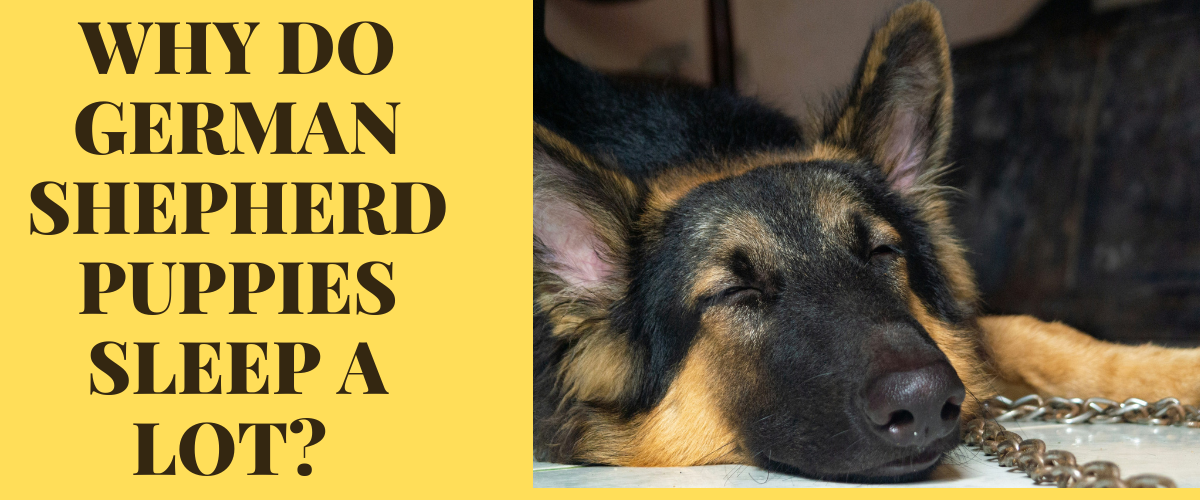German Shepherd puppies are not just cute companions; they are intelligent, loyal, and destined for greatness. If you have faced problems associated with German Shepherd puppy sleep, you are in the right place.
This blog post will make you clear about ” why German shepherd puppies sleep a lot?” and “what you should do about it?”
Like many other breeds, German Shepherd puppies require substantial sleep due to their rapid growth and development.
On average, a German Shepherd puppy sleeps anywhere from 15 to 20 hours a day. Puppies, in general, need more sleep than adults, as their bodies and brains are actively growing and maturing.
It’s important to understand that sleep patterns can vary from one individual puppy to another.
German Shepherd puppies tend to sleep more than adult German Shepherds.
Like all puppies, German Shepherd pups are in a rapid growth and development phase, which requires ample rest.
A German Shepherd puppy may sleep 15 to 20 hours daily. This extensive sleep is essential for their physical and cognitive development.
As German Shepherds mature into adults, their sleep patterns typically change.
Adult German Shepherds usually sleep around 12 to 14 hours a day, which is still relatively high compared to other breeds.
However, it’s notably less than their required sleep during their puppyhood.
Increased sleep in German Shepherd puppies is a natural part of their early life stages, supporting their overall health and well-being.
As they grow, become more active, and mature in their bodies and minds, their sleep needs gradually decrease, and they develop more predictable sleep patterns akin to those of adult dogs.
Some may need more sleep, while others may be more active. Playtime, mental stimulation, and overall health can also influence a puppy’s sleep needs.
Table of Contents
ToggleWhich factors affect the sleep of German Shepherd puppies?
Many factors can influence the sleep patterns of German Shepherd puppies. It’s important to understand these factors before jumping to a conclusion.
Age:
Early Puppyhood: Very young puppies, especially those under three months old, require 18 to 20 hours of sleep per day
Later Puppyhood: As puppies grow older, their sleep needs gradually decrease, and they become more active during waking hours.
Health:
Illness or discomfort:
Health issues or discomfort, such as digestive problems, infections, or teething pain, can disrupt a puppy’s sleep. You should consult a veterinary doctor quickly to solve these problems.
Diet:
Illness or Discomfort: Health issues or discomfort, such as digestive problems, infections, or teething pain, can disrupt a puppy’s sleep. You should consult a veterinary doctor quickly to solve these problems.
Exercise:
Nutrition: The type and quality of food can impact a puppy’s overall health, energy levels, and, subsequently, sleep patterns.
Mental Stimulation:
Physical Activity: Adequate playtime and physical exercise during waking hours contribute to a tired and content puppy, promoting better sleep.
Environment:
Sleep Space: Providing a comfortable and quiet sleep environment promotes quality rest. A cozy bed or crate can offer a sense of security.
Routine and Consistency:
Establishing a Schedule: Puppies thrive on routine. Consistency in feeding, playtime, and sleep helps regulate their internal clock.
Socialization:
Social Interaction: Positive socialization experiences with people and other pets can contribute to a puppy’s emotional well-being, influencing their ability to relax and sleep peacefully.
Training Practices:
Positive Reinforcement: Using positive reinforcement rather than punitive measures during training creates a positive association with activities, reducing stress and promoting relaxation.
Genetics:
Breed Characteristics: While individual dogs may vary, certain breed traits, including energy levels and temperament, can influence sleep patterns.
Frequently Asked Questions (FAQs):
Q: Is it normal for my German Shepherd puppy to nap so frequently?
Yes, it’s entirely normal. Puppies generally need more sleep than adult dogs, and extensive napping is vital for their physical and cognitive development.
Q: When do German Shepherd puppies start sleeping less?
Their sleep patterns naturally adjust as German Shepherd puppies age and become more active. You may notice a reduction in sleep hours as they reach adolescence.
Q: How can I create a suitable sleep environment for my German Shepherd puppy?
Provide a comfortable bed or crate in a quiet and cozy location. Establishing a routine and maintaining a calming bedtime routine can contribute to a restful environment.
Q: When should I seek veterinary advice about my German Shepherd puppy’s sleep patterns?
If you notice significant changes in behavior, persistent lethargy, or concerns about your puppy’s overall well-being, consult a veterinarian for professional guidance.




